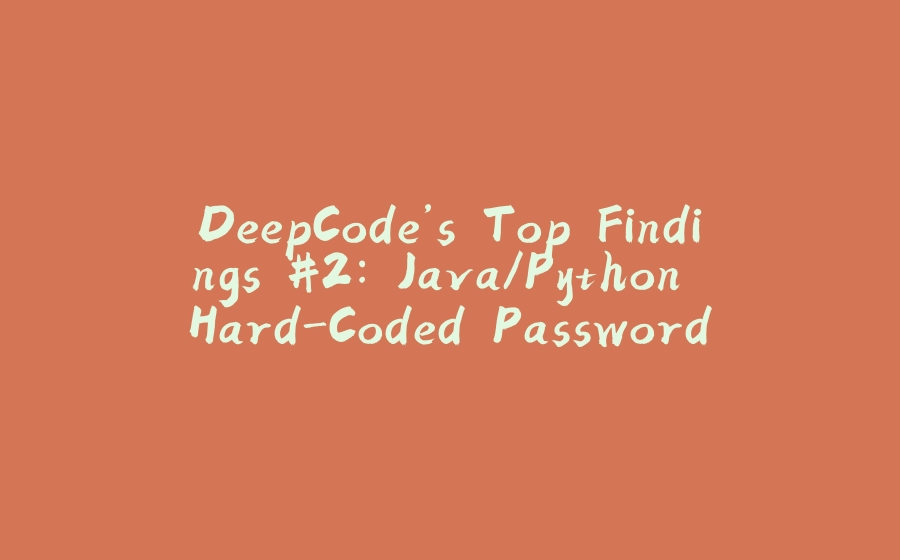DeepCode Top Findings (13 Part Series)
1 DeepCode’s Top Findings #1: Java Date (This one made me dizzy)
2 DeepCode’s Top Findings #2: Java/Python Hard-Coded Password
… 9 more parts…
3 DeepCode’s Top Findings#3: Java missing Close or Flush
4 DeepCode’s Top Findings#4: JavaScript Attribute Access on NULL
5 DeepCode’s Top Findings#5: JavaScript Unsanitized Input is used to build RegEx
6 DeepCode’s Top Findings#6: JavaScript Result of Typeof not compared with String
7 DeepCode’s Top Findings#7: Python Use Real Floor Division
8 DeepCode’s Top Findings #8: The ZIP Slip
9 DeepCode’s Top Findings #9: Deadlocks
10 DeepCode’s Top Findings #10: Confusing Use of ‘!’
11 DeepCode’s Top Findings #11: Synchronizing Strings
12 DeepCode’s Top Findings #12: Integer Promotion on Bitwise Operations in C
13 DeepCode’s Top Findings #13: Writing Immutable Objects in Python
Hey,
Language: Java/Python
Defect: Password / Login (Category Security 2)
Diagnose: Hard-coded literals are used as parameters in functions known to be password protected
See an example in Java here.
UPDATE (1/7/2020): CISCO hard-coded credentials here CVE-2019–15977 and here CVE-2019–15975.
Background:
DeepCode learns from open source repositories. As an example, we know what are typical sources of passwords or secrets in applications. Typically, functions that read in from a protected configuration store. We trace the flow this data takes through open-source applications and are able to identify typical sinks or users of these secrets (e.g., database or API logins). After we identified these sinks, we can now enforce that no secret data results from a source that is not protected, such as a hard-coded constant in your source code.
Obviously, having your passwords hard-coded in your application is a bad practice. The Common Weakness Enumeration lists it twice: Both CWE 259 Use of Hard-Coded Passwords and CWE 798 Use of Hard-Coded Credentials. OWASP also lists it.
Besides the risk of leaking password information to your dev team or anyone else having access to your source code, it makes it extremely hard to change the password for the operational side. I guess it is a no-brainer to not plaster secret keys into files they do not belong in. ‘nough said.
But there is another interesting aspect to this. We see quite some false positives with this bug. The reason is that it might be legitimate to use the functions with a hard-coded password in testing or when both systems interacting are trusting each other by default. Yes, we can have discussions now if this practice is legitimate or not. But, let us accept it for now. Obviously, false positives are something we would like to prevent as much as possible. So, what shall we do?
We decided on the strict side of things. We accept some false positives but rather report possible issues. If you want to prevent false positives, we offer two ways: (1) With the .dcignore file (see here ) or (2) by adding a comment in your file (see here ). Better safe than sorry. So, give it a run at deepcode.ai …
CU
0xff
DeepCode Top Findings (13 Part Series)
1 DeepCode’s Top Findings #1: Java Date (This one made me dizzy)
2 DeepCode’s Top Findings #2: Java/Python Hard-Coded Password
… 9 more parts…
3 DeepCode’s Top Findings#3: Java missing Close or Flush
4 DeepCode’s Top Findings#4: JavaScript Attribute Access on NULL
5 DeepCode’s Top Findings#5: JavaScript Unsanitized Input is used to build RegEx
6 DeepCode’s Top Findings#6: JavaScript Result of Typeof not compared with String
7 DeepCode’s Top Findings#7: Python Use Real Floor Division
8 DeepCode’s Top Findings #8: The ZIP Slip
9 DeepCode’s Top Findings #9: Deadlocks
10 DeepCode’s Top Findings #10: Confusing Use of ‘!’
11 DeepCode’s Top Findings #11: Synchronizing Strings
12 DeepCode’s Top Findings #12: Integer Promotion on Bitwise Operations in C
13 DeepCode’s Top Findings #13: Writing Immutable Objects in Python
原文链接:DeepCode’s Top Findings #2: Java/Python Hard-Coded Password























暂无评论内容